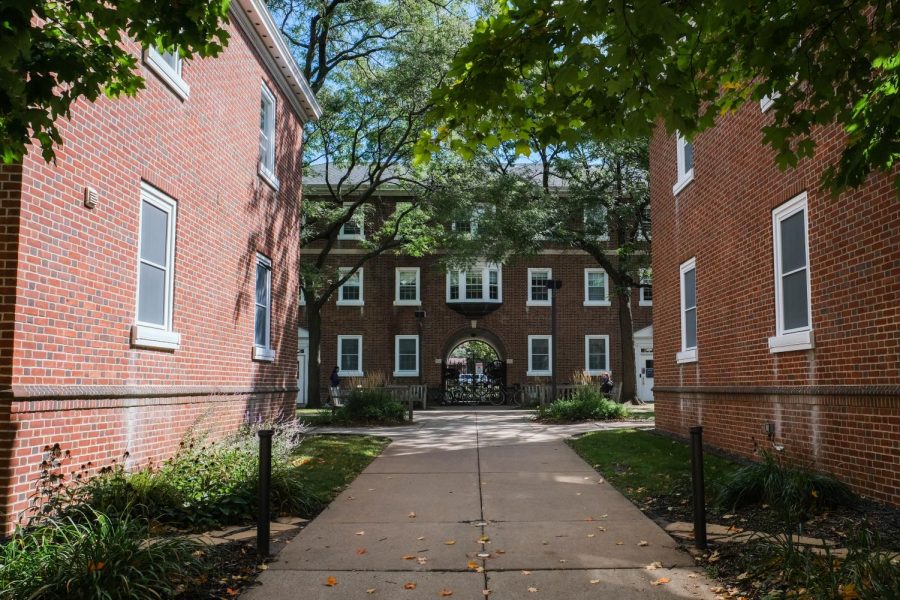Macalester reports six on-campus cases of COVID-19
April 15, 2021
On April 7, Macalester’s COVID-19 dashboard updated to report four on-campus cases of COVID-19, and six students in quarantine due to close contact with someone who tested positive. Since then, the number has swelled to six on-campus COVID cases and 11 students in quarantine as of April 11. That number has not changed as of this publishing.
On-campus cases of COVID-19 have been a rarity for the college throughout the pandemic. The last and only time Macalester reported an on-campus COVID-19 case was in November, when five students on campus tested positive. There have been a handful of off-campus as well as faculty and staff cases of COVID-19, but no major COVID-19 outbreaks have been reported on campus.
The cases come at a time where Macalester has relaxed COVID-19 restrictions compared to the first three modules of the year — the school began allowing athletic competition at the beginning of April for the first time since last year, allowing in-person spectators at outdoor sporting events and opening the alumni gym courts and swimming pool to non-athletes.
Vice Provost and Director of COVID Operations Paul Overvoorde wrote in an email to The Mac Weekly that “there are a set of cases that likely arose from the same off-campus activity,” but that this isn’t true of all six on-campus cases. The Mac Weekly was unable to obtain details on what the off-campus activity was that led to the spread of COVID-19 amongst on-campus students.
Overvoorde said that in the event that on-campus cases continue to rise, the college would consider taking more precautions “depending on the pattern of cases.” He pointed to precautions practiced during quiet periods at the beginning of the semester as an example: suspending in-person classes, labs, practice sessions, work study shifts and rehearsals and closing off public gathering spaces for students. But as of now, the college does not plan to do so.
Pierce Hastings ’22 received an email that she and members of her in-person class had come into contact with someone who tested positive for COVID-19. Hastings said that their last in-person class was on Monday, April 5, and the following day, she learned that she had come into contact with someone who tested positive for COVID-19. On Wednesday evening, April 7, she received the contact tracing email from the COVID case management team.
Because Hastings was not considered a close contact of the individual that tested positive, she did not have to quarantine, but took a COVID-19 test the following day per the instructions from the contact-tracing email. Being a close contact means that one was within 6 feet of an individual with COVID-19 for 15 minutes or more.
She tested negative. But she was concerned about the 36 hour window between when she first learned about the exposure and when she received the contact tracing email.
“I had already attended an in-person class [Wednesday] morning and taken an exam,” Hastings said. “It just seems like it was kind of not the best scenario, obviously, because you should let people know as soon as possible so that they stop having contacts.”
Overvoorde said that the contact tracing team tries to initiate contact tracing “as soon as possible” when they learn of a positive case — usually that means within a few hours, but the pace of contact tracing depends on how quickly someone who tested positive takes to inform the team of their close contacts, too.
Overvoorde also said that the contact tracing team only reaches out to class and group members who were not close contact with a person with COVID-19 “in rare instances” and “out of an abundance of caution.” Usually the reason the team would choose to do so is in situations where the likelihood of COVID-19 transmission is higher due to “increased movement, aerobic demands or exertion.”
So far no students notified in this manner have tested positive, he said.
As of Thursday, April 15, 1,111 people have been vaccinated at Macalester: 687 students and 424 faculty and staff. But with the many members of the campus community still waiting to get vaccinated and the rise of more contagious variants, COVID-19 spread evidently remains a risk on campus.
“It is still a race between vaccine herd immunity and B.1.1.7,” Overvoorde wrote. “Although we wish the vaccine was more widely available and are still advocating for on-campus access, until that time, each person that gets vaccinated is a step in the right direction.”














